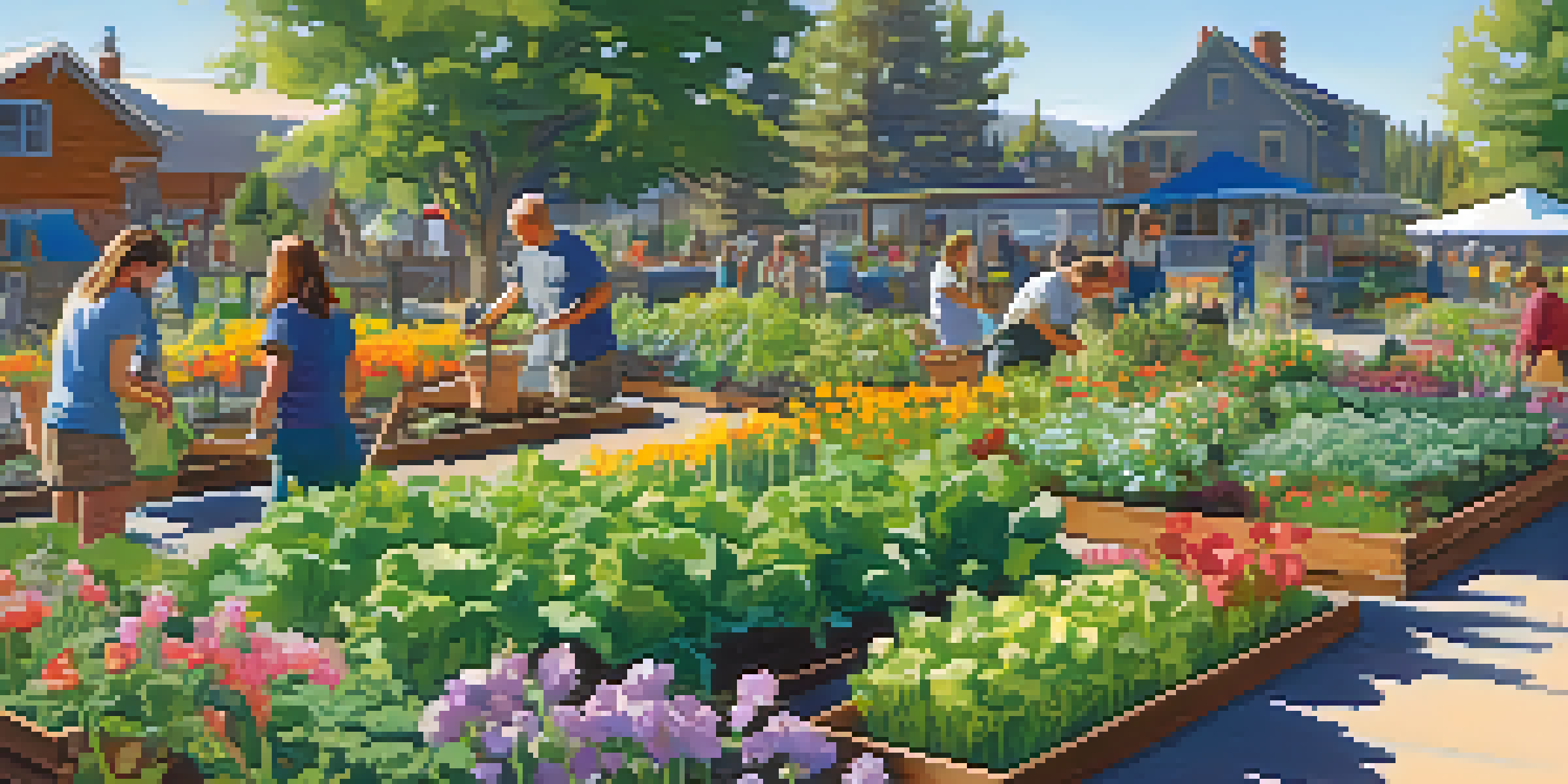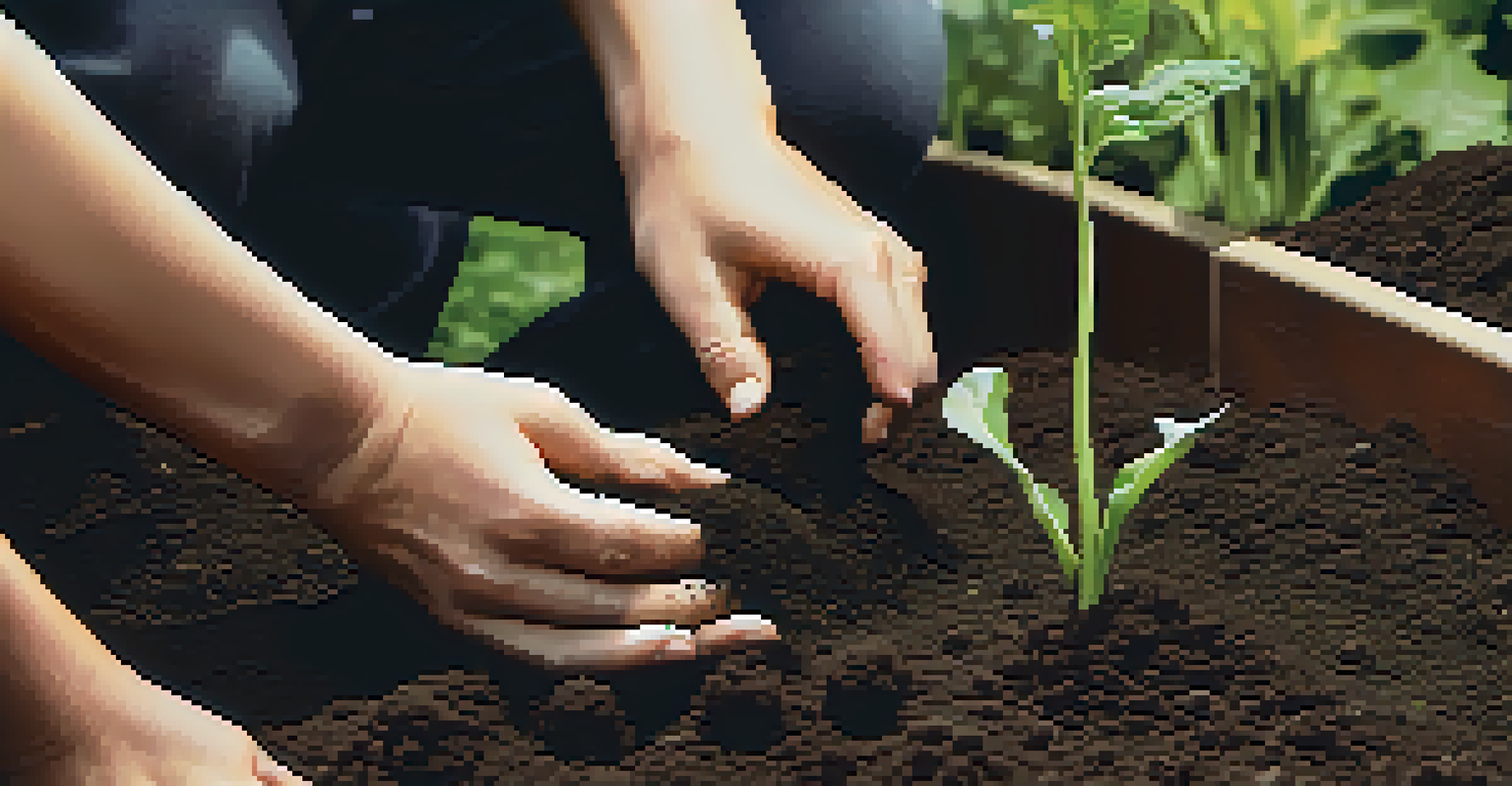Volunteer Opportunities in Big Bear's Community Gardens

Understanding the Importance of Community Gardens
Community gardens serve as more than just patches of land; they are vibrant hubs where locals come together to grow food, share knowledge, and foster friendships. In Big Bear, these gardens play a crucial role in promoting sustainability and enhancing food security. They also provide a unique opportunity for residents to connect with nature, all while beautifying the neighborhood.
Gardening is a way of showing that you believe in tomorrow.
Gardens contribute to the environment by supporting biodiversity and creating green spaces. This is essential in urban areas where concrete often dominates. By participating in community gardens, you are not just growing plants; you're cultivating a sense of belonging and community spirit.
Whether you're an experienced gardener or just starting out, the welcoming atmosphere of Big Bear's community gardens invites everyone to contribute. It's a chance to learn and grow—both literally and figuratively!
Types of Volunteer Roles Available
In Big Bear's community gardens, there are several volunteer roles to suit various interests and skill levels. From planting and weeding to organizing events and educating others about gardening, there’s something for everyone. Whether you want to get your hands dirty or prefer to support behind the scenes, your contribution is valued.

Garden maintenance is a hands-on role, perfect for those who enjoy physical activity. You can spend your time planting seeds, tending to existing plants, and ensuring the garden thrives. If you have a knack for planning, consider organizing workshops to teach gardening skills to newcomers.
Community Gardens Foster Connection
Community gardens in Big Bear serve as vibrant spaces where locals can grow food, build friendships, and enhance their neighborhood's beauty.
Additionally, some volunteers focus on outreach and community engagement, helping to spread the word about the gardens and their benefits. This role is ideal for those who enjoy connecting with people and sharing the joy of gardening.
Benefits of Volunteering in Community Gardens
Volunteering in community gardens offers numerous benefits that extend beyond just giving back. For many, it’s an excellent way to develop new skills, gain gardening knowledge, and even improve physical fitness. The act of gardening itself can be therapeutic, providing a sense of peace and fulfillment.
The greatest gift of the garden is the restoration of the five senses.
Moreover, working alongside fellow volunteers fosters friendships and strengthens community ties. You’ll meet people from diverse backgrounds, all united by a love for nature and sustainability. These connections can lead to lasting relationships and a stronger community overall.
Lastly, volunteering can also enhance your resume. If you're looking to enter the environmental or non-profit sectors, hands-on experience in community gardens showcases your commitment to sustainability and community service.
How to Get Started as a Volunteer
Getting started as a volunteer in Big Bear's community gardens is easier than you might think! Many gardens have dedicated websites or social media pages where you can find information about upcoming volunteer days and events. Simply sign up for a session that fits your schedule.
Before diving in, consider visiting the gardens to get a feel for the community and the specific activities they offer. This firsthand experience will help you understand where your interests and skills can best be utilized. Plus, you’ll get to meet current volunteers and learn from their experiences.
Volunteering Offers Personal Growth
Volunteering in community gardens not only develops gardening skills but also fosters friendships and strengthens community ties.
Don’t hesitate to reach out with any questions you might have. Garden coordinators are usually thrilled to welcome new volunteers and can provide guidance on how to get involved.
Safety and Sustainability Practices
When volunteering in community gardens, it’s essential to follow safety guidelines to ensure a positive experience for everyone involved. This includes wearing appropriate clothing and using tools safely. Most gardens also provide training sessions for new volunteers, covering everything from tool use to pest management.
Sustainability practices are at the heart of community gardening, and volunteers are encouraged to embrace eco-friendly methods. This can include composting, using organic pest control, and conserving water. By practicing sustainable gardening, you’ll not only contribute to the health of the garden but also to the environment.
Additionally, being aware of the local wildlife and plants helps create a balanced ecosystem within the garden. Learning about these relationships can enhance your gardening skills while respecting nature.
Community Events and Workshops
Big Bear's community gardens are vibrant places for hosting events and workshops that engage people of all ages. These gatherings often include seed swaps, planting days, and seasonal festivals celebrating the harvest. Such events not only promote gardening but also create a sense of celebration and community spirit.
Workshops are typically led by experienced gardeners and can cover a wide range of topics—from organic gardening techniques to cooking demonstrations using fresh produce. Participating in these events can deepen your understanding of gardening and inspire you to try new methods at home.
Engaging Events Promote Learning
Community events and workshops in Big Bear's gardens provide opportunities for learning new gardening techniques and celebrating local produce.
Attending community events is also a great way to meet fellow garden enthusiasts, share experiences, and build friendships. Plus, it’s an opportunity to celebrate the collective effort of the community in creating and maintaining these beautiful spaces.
Success Stories from Local Volunteers
Every garden has its own success stories, and Big Bear's community gardens are no exception. Many volunteers have shared how their experiences have transformed their lives, from gaining confidence in gardening to developing new friendships. For instance, one volunteer started as a novice but became an expert in organic gardening, eventually leading workshops.
These success stories highlight not just personal growth but also the positive impact volunteers have on the community. Many have gone on to implement sustainable practices in their homes, inspiring others to do the same. The ripple effect of their involvement extends far beyond the gardens.

Additionally, volunteers often celebrate their achievements with community potlucks, where everyone shares dishes made from the garden's harvest. These gatherings reinforce the idea that community gardening is not just about growing food but also about nurturing relationships.